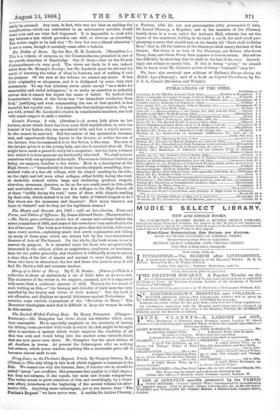Prosy Jane; or, the Puritan's Bequest. 2 vols. By Gregory
Graves, M.A. (Virtue.)—The only thing in this book which suggests a comment is the title. We cannot see why the heroine, Jane, if heroine she is, should be called "prosy "par excellence. She possesses that quality in a high degree, but does not surpass, if she equals, her male and female companions. The writer seems to grow conscious of this, and accordingly, by a despe- rate effort, introduces at the beginning of the second volume his alter- native title. Anything more extravagant, not to say insane, than "The Puritan's Bequest" we have never seen. A certain Sir Arthur Chesney, a Puritan, kills his son and presumptive (why presumptive?) heir, Sir Lionel Chesney, a Royalist; and in the mansion of the Chesney family there is a room called Sir Arthur's Hall, wherein has sat the figure of the murderer, holding in its hand a scroll, the said scroll pro- phesying a curse that should rest on the family till "Devi shall to Dulaa flow," that is, till the heiress of the Chesneys shall marry the heir of the Gwyns. But there is an heir of the Chesneys, one Robert who loves- Prosy Jane, and whom Prosy Jane appears to love in return. She solves the difficulty by resolving that he shall be the last of his race. Accord- ingly she refuses to marry him. If this is being "prosy," we should like to know what Mr. Graves's notion of being " romantic " may be !
We have also received new editions of Hallam's Europe during the Middle Ages (Murray) ; and of a book on Capital Punishment, by Dr. J. C. L. Carson (Houlaton and Wright).






























 Previous page
Previous page